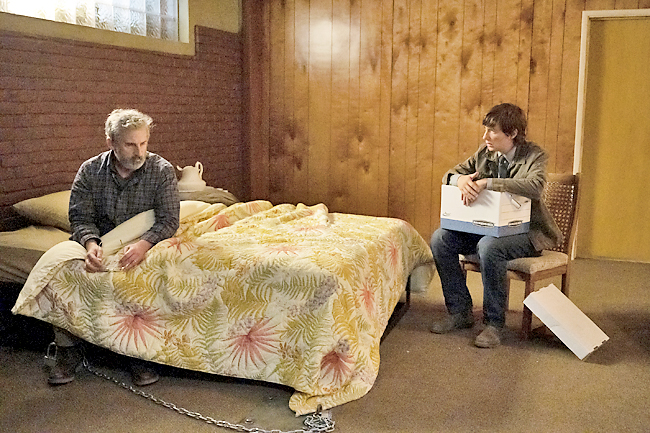By Inkoo Kang
THE WASHINGTON POST – As far as cages go, the one confining Alan Strauss (Steve Carell) could be far less comfortable. He’s got his own sunlit room, with a clean, homey bed that could easily sleep two and a nightstand that holds his heart medicine, as well as his foot-fungus treatment.
He’s got a wide, calming view of the greenery just outside, courtesy of the glass sliding doors opposite the bed, and above his head floats an adorable, cloud-shaped lamp that offers a touch of childlike whimsy.
There can’t be any complaints about the food – takeout from the finest restaurants in town, chosen with care by someone with reason to know the best places to eat.
But Alan is also shackled to the floor by his ankle, and forced to provide psychotherapy to his captor Sam (Domhnall Gleeson), a serial killer who no longer wants to kill.
The well-worn genres of the therapy drama and the serial-killer thriller are revitalised by their union in FX on Hulu’s The Patient. In the current landscape of endless, often numbingly derivative content, it’s hard to think of a greater credit to a series than a truly novel premise.

Suspenseful and darkly funny, the 10-part limited series supplies a fairly original B-plot as well: Alan’s reflections on his adult son’s (Andrew Leeds) conversion, a turn toward social conservatism that alienates him from his more liberal parents.
That story line’s closest precedent on television is probably on The Americans, where atheistic Soviet spies Philip and Elizabeth Jennings struggle to comprehend their teenage daughter Paige’s newfound quest for spiritual meaning.
As it happens, The Patient is created by Joel Fields and Joe Weisberg, the showrunners of that earlier drama.
It’s tempting to praise The Patient by comparing it to the series it breezily outclasses.
Unlike the FBI profiling drama Mindhunter, it’s seldom interested in the lurid side of serial murder.
And in contrast to the talky, therapy-set In Treatment, it never feels like a showy acting exercise. Despite its high-concept opening scenario, the series is anchored by an emotional naturalism that extends to all the performances.
More pertinently, it makes us care far more about why Sam kills rather than how he does it.
Despite a stunted social life and a slightly flat affect, Sam is jarringly – and wholly convincingly – normal, down to his addiction to Dunkin’ coffee. (I’d love to have been a fly on the wall for that product-placement discussion). From the start, Sam’s singularly fixated on the abuse he experienced at the hands of his father during his childhood.
He is certain that it has irreparably messed him up, and, ironically, that nothing could be as bad as becoming as violent as his dad.
A punctilious restaurant inspector by day, he has convinced himself that he is also a fair judge, jury and executioner when it comes to his victims. But he’s not exactly a lone wolf; he enjoys a nearly mundane relationship with his mum, Candace (a scene-stealing Linda Emond). Mother and son are admirers of Alan’s books – though as the five-hour season goes on, Sam begins to wonder whether the therapist might just turn out to be another body he’ll have to dispose of.
A small miracle that The Patient pulls off is that Alan remains the season’s most compelling character. We rarely leave the wood-panelled basement prison with Sam, but we do often with Alan.
Flashbacks introduce us to his wife, Beth (Laura Niemi), who died of cancer not long ago, and to his son Ezra, whose devout religiosity became a wedge within the family.
Lacking a television or anything to occupy his mind save for Sam’s sessions, Alan soon begins to dissociate into conversations with his own deceased therapist (David Alan Grier).
He also has visions of Auschwitz – perhaps the one facet of the series that doesn’t fully coherent.
Dwelling on his broken family and realising that he’d played a far larger role in its fracture than he’d previously thought, his resolve to escape becomes that much more urgent.
For all its character depth, the slyly plotted season has no shortage of twists and surprises.
Once Sam drags to the basement another potential victim, the grey-bearded, physically faltering Alan has to start weighing whom he’s willing to hurt or let die to continue surviving himself.
Much of the tension in the later chapters revolve around whether Fields and Weisberg can stick the landing by doing justice to both the emotional and thriller aspects of their series and, as with The Americans, the ending feels simultaneously unexpected and inevitable. It’s a more-than-worthy follow-up to one of the best dramas of the past decade.


